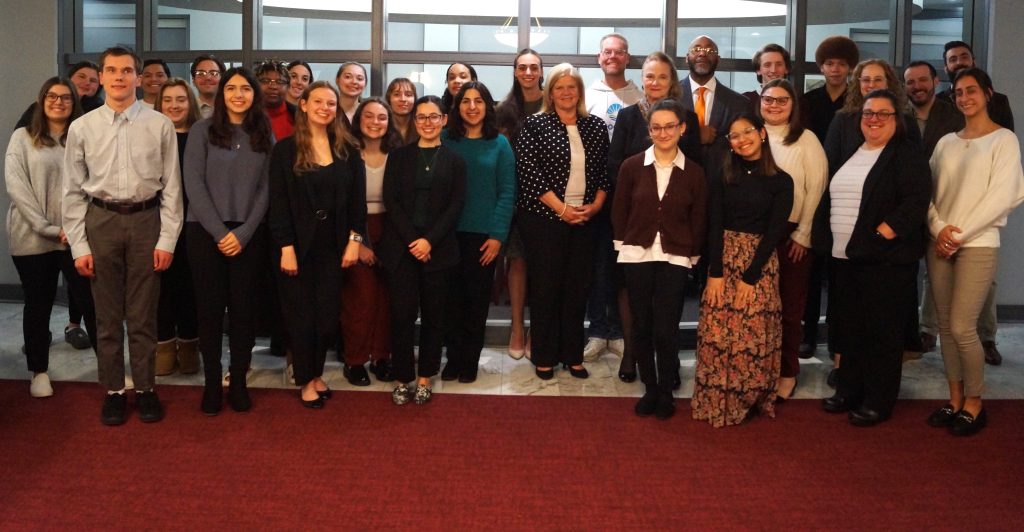In the middle of a nationwide teacher shortage, fewer and fewer college students are choosing careers in teaching. CEA Aspiring Educators met as a group with legislators on the Education Committee for the first time recently and shared personal stories about the obstacles to becoming a teacher, including unpaid student teaching and low starting salaries.
An education student at UConn told legislators that she is currently student teaching in a second-grade classroom—a job that necessitates waking at six in the morning and doesn’t get her home until 4 p.m.
“Monday, I work for Big Brothers and Big Sisters, I have a night class, other volunteer obligations, and I work weekends. I have almost no social life, and all my spare time goes toward lesson planning or EdTPA,” she said. “I’m burning out all ready and I haven’t officially become a teacher yet.”
Another aspiring educator said she doesn’t receive financial support from her parents and currently works two jobs to make ends meet—substitute teaching during the week and working a retail job on the weekends. Between attending classes, completing classwork, and working multiple jobs, her schedule is already packed.
“I’m already so nervous about completing my student teaching next year,” she said. “I will likely be forced to quit a paid job to take on an unpaid one. Unpaid student teaching is a big barrier for people like me.”
One aspiring educator had to quit his job as a preschool teacher to fulfill his student teaching obligation. “I went from a job that paid me money as a preK teacher to basically having to pay money to do the same job I was doing.”
The aspiring educators said when they look at fellow students who take on paid internships in finance or business and go on to receive higher starting salaries, they feel like their decision to become teachers isn’t valued.
“It’s so hard to choose a career that’s something you really love but then to realize you’re not able to provide for yourself or your loved ones,” an aspiring educator said.
Legislators respond

CEA Aspiring Educators and legislators posed for a photo following their meeting.
State Rep. Jeff Currey, house chair of the Education Committee, said that the committee has language mandating a $60,000 starting salary for teachers in a bill that will be heard at a March public hearing.
“Let’s put a number on paper so we can truly start a conversation about compensation for teachers,” he said. “We’re in a short session, so we do need to manage expectations about what the outcome of that bill will be.”
State Rep. Irene Haines, a member of the Education Committee, said that her daughter is a music teacher who works three jobs in addition to her public school position. “She loves what she does, but it’s to the point that she doesn’t have time to get laundry done. We need to look at our teacher salaries and figure out a way to get this done.”
“I commend every last one of you around the table for choosing a career in education to give back and move our country forward,” said State Senator and Education Committee Senate Chair Doug McCrory. “In every other profession they get paid internships.”
State Rep. Kathleen McCarty, ranking member of the Education Committee, told the aspiring educators, “We think this is an important opportunity for everyone to weigh in. We don’t have all the answers, but we’re interested in trying to find a solution.”
“It’s really important to have you all come out to speak and submit testimony,” said Haines. “Even when committee members can’t be there for a public hearing, they go back and read written testimony. Your words matter when it comes to crafting and voting on a bill.”
An aspiring educator shared his appreciation that the Education Committee is willing to begin a public discussion of a $60k starting salary.
“Considering a $60k starting salary is awesome,” he said. “If there’s not guaranteed step movement though then you risk districts just freezing pay, and then you fall behind again.”
“It depends on how we handle the issue,” Currey said. “It’s not just about starting salary, but also ending salary—where you can ultimately land.”
Make sure legislators know where you stand on education issues they’re considering this session. Register for the second annual CEA Breakfast with Legislators this Saturday, February 24, 9 a.m. to 12 p.m.
This unique opportunity will allow you to talk directly with legislators about what’s going on in your classroom and share what you and your students need to be successful, as well as discuss priorities for CEA-Retired members and CEA Aspiring Educators.







